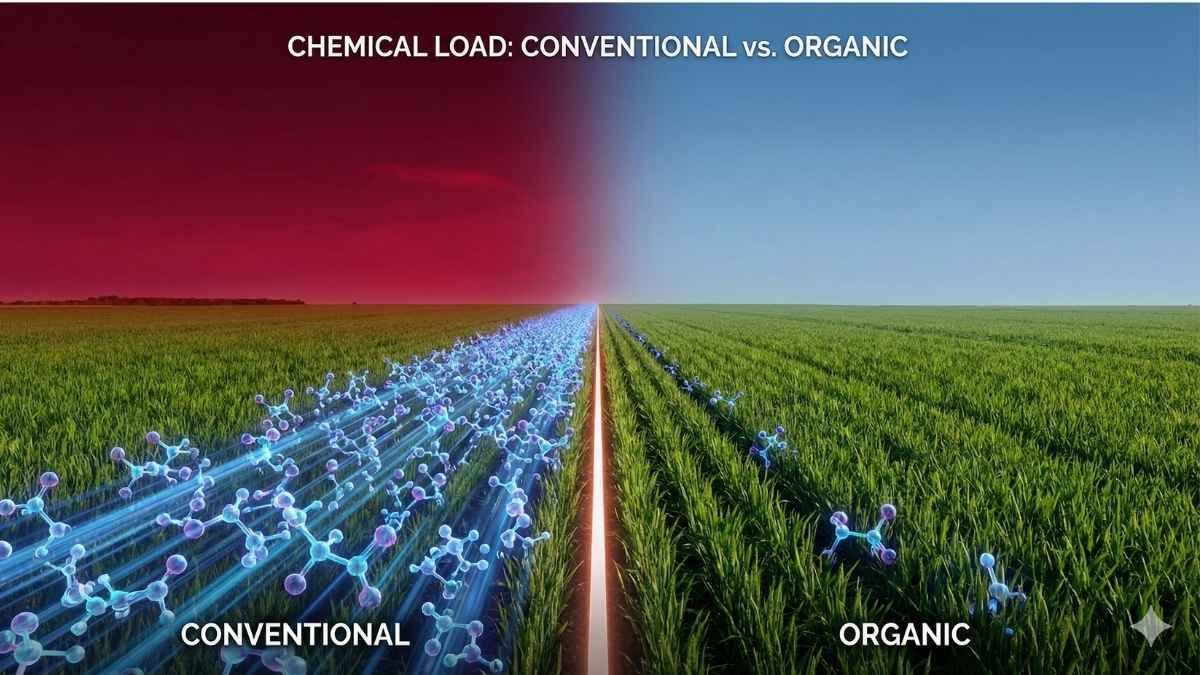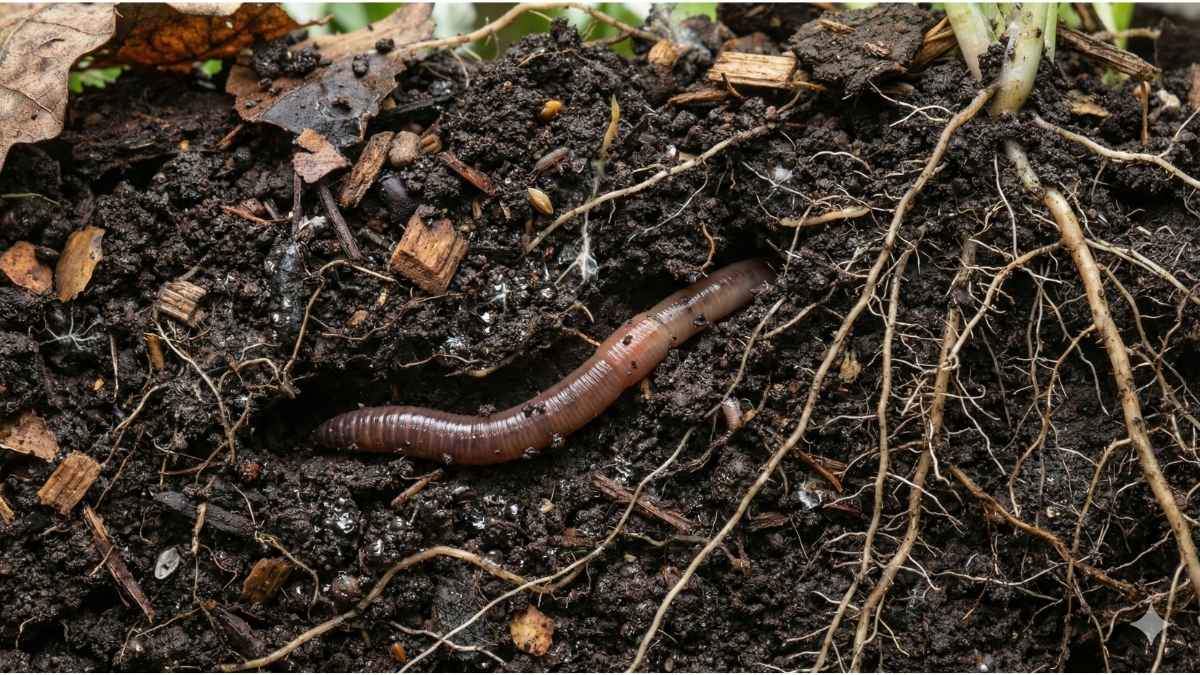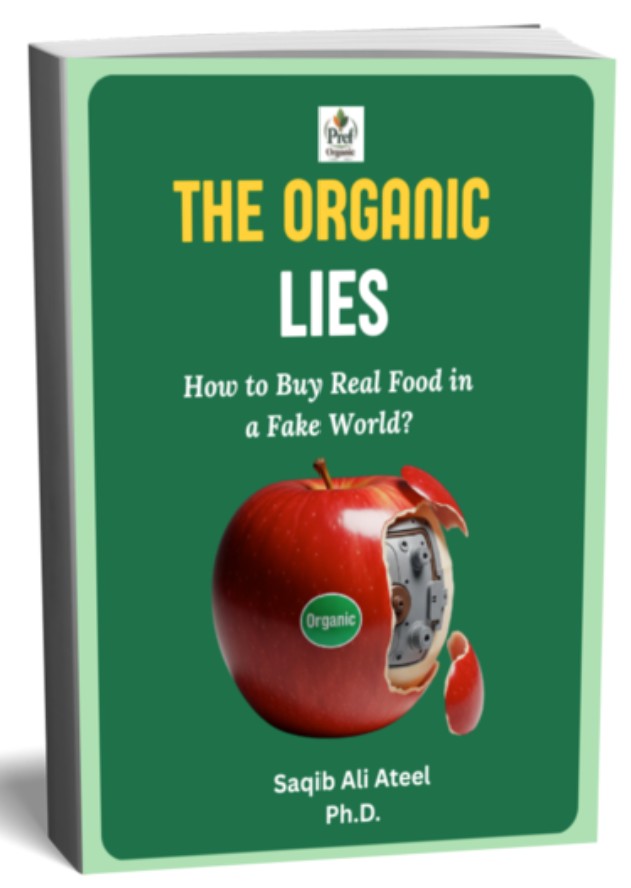Is Organic Food Really Worth It? A PhD Farmer’s Deep Research for the 10 Core Benefits of
Organic Food
You’re standing in the grocery aisle, looking at two bunches of spinach. One is conventional. The other is organic, and it costs more.
A dozen questions rush through your mind. Is the organic one really safer for my kids? Is it more nutritious? With a tight family budget, can I justify the extra cost? You’ve heard the scary headlines, and you’ve seen the marketing hype. You just want a straight answer from someone you can trust.
My promise to you is simple: to cut through the noise and give you a clear, balanced, and practical guide. This isn’t a sales pitch. This is a conversation about the real benefits of organic food.
If you’ve read our foundational article, “What Are Toxins in Food?”, you already understand the landscape of potential risks. Now, let’s explore the solution. We will walk through the 10 core organic food benefits, look at the science, and, most importantly, answer that critical question: Is it worth it for your family?
Let’s find your confidence, together. ❤️
🛡️ Your Clarity Roadmap: The Core Organic Benefits Unlocked
- ✅ The Family Shield: Discover how switching to organic can reduce synthetic pesticides in your body by an average of 60% in just six days, offering crucial protection, especially for children.
- ✅ Beyond the Plate: Learn how organic choices support a healthier planet, enhancing biodiversity , building resilient, living soil , and protecting vital water resources.
- ✅ The Nutritional Edge: See the balanced view on nutrition, including evidence that organic produce can have significantly higher concentrations of protective antioxidants like polyphenols.
- ✅ Your Budget-Smart Action Plan: Get the PrefOrganic "Priority List" to focus your budget on the foods that give you the most protection—like thin-skinned produce and high-frequency items—without breaking the bank.
Replace confusion with the confidence that you are making the best choices for your family.
Part 1: The Benefits for Your Family’s Health &
Safety
For most parents, this is the heart of the matter. What are the tangible benefits of eating organic food when it comes to protecting your family? Let’s look at the science.
Benefit #1: Drastically Lower Exposure to Pesticides
This is, without a doubt, the most significant and well-documented of the organic food benefits. Conventional agriculture relies on synthetic pesticides to protect crops. While regulators set Maximum Residue Limits (MRLs), the goal for any health-conscious parent is to minimize exposure, especially for children.
Numerous large-scale studies have confirmed that people who eat a primarily organic diet have significantly lower levels of synthetic pesticides in their bodies. One landmark study published in the journal Environmental Research found that switching to an organic diet reduced the levels of certain pesticides in participants' bodies by an average of 60% in just six days. For children, whose developing bodies are more vulnerable to toxins, this reduction is particularly crucial.
Think of your body like a bucket. Every day, little drips of chemicals from different sources go into the bucket. A single drip won’t make it overflow, but over time, many drips can fill it up. Choosing organic food is like turning off one of the biggest faucets. You’re not eliminating every single drip, but you are significantly slowing the rate at which your family’s bucket fills up.
 The Visual Difference: Choosing organic results in a drastic reduction of chemical exposure, slowing the rate at which synthetic pesticides build up in the body.
The Visual Difference: Choosing organic results in a drastic reduction of chemical exposure, slowing the rate at which synthetic pesticides build up in the body.Benefit #2: No Synthetic Hormones or Routine Antibiotics
in Meat & Dairy
In conventional livestock farming, synthetic growth hormones are often used to speed up growth, and antibiotics are sometimes used routinely to prevent illness in crowded conditions. Organic standards strictly forbid these practices.
The concern is twofold. First, there are questions about the long-term effects of consuming trace amounts of synthetic hormones. Second, the overuse of antibiotics in agriculture is a major contributor to the global crisis of antibiotic-resistant bacteria. The World Health Organization (WHO) has repeatedly warned about this threat. Organic farming practices help combat this by requiring that animals are raised in conditions that naturally promote health, without a reliance on routine drug use.
Imagine two classrooms. One is overcrowded, and the teacher gives everyone a daily dose of medicine to prevent anyone from getting sick. The other classroom has more space, fresh air, and a healthy environment, so the students rarely need medicine. Organic livestock farming is like the second classroom—it focuses on creating healthy conditions from the start, so routine drugs aren’t necessary.
Benefit #3: The Absence of Genetically Modified Organisms
(GMOs)
Organic standards prohibit the use of GMOs. This is a core principle of the organic philosophy, which prioritizes traditional breeding and natural systems.
While the scientific consensus is that currently approved GMO crops are safe for consumption, the debate is more about the agricultural system they represent. Many GMO crops are engineered to be resistant to specific herbicides, which can lead to increased use of those chemicals. For many consumers, choosing organic is a way to opt out of this system and support a different approach to farming. It’s a vote for a system that relies on crop rotation and natural pest control rather than genetic engineering.
Think of a recipe. Conventional farming might change the recipe for a tomato plant in a lab so it can survive being sprayed with a weed killer. Organic farming adheres to the original recipe, focusing instead on making the soil and environment so healthy that the tomato plant can thrive on its own, without needing any special intervention.
Benefit #4: Potentially Higher Levels of Certain
Nutrients 🧠
This is one of the most debated topics, and I want to give you an honest, balanced view. The evidence suggests that organic foods can have a nutritional edge in specific areas.
A major meta-analysis combining the results of hundreds of studies found that organic produce tends to have significantly higher concentrations of antioxidants, such as polyphenols, compared to conventional produce [placeholder for verified source]. Organic dairy and meat have also been shown to contain higher levels of beneficial omega-3 fatty acids. However, the differences in vitamins and minerals are often small and can vary depending on the crop, soil, and weather. The primary nutritional advantage appears to be in these protective compounds.
Imagine two tomato plants. One is grown in average soil and given a standard liquid fertilizer. The other is grown in rich, living soil full of compost and beneficial microbes. Both plants will produce tomatoes, but the one from the healthier, more complex soil might develop more of the special compounds that protect it from stress—the plant’s own immune system. Those protective compounds are the antioxidants that benefit us when we eat the tomato.
Part 2: The Benefits for Our Planet 🌍
Your choice in the grocery aisle sends a ripple effect all the way back to the farm. The benefits of eating organic food extend far beyond your kitchen table.
Benefit #5: Promotes Healthier, More Resilient Soil
As a farmer, I can tell you this is the foundation of everything. Healthy soil is a living, breathing ecosystem, and organic farming is designed to feed it.
Organic practices like composting, cover cropping, and crop rotation build up organic matter in the soil. This improves soil structure, water retention, and nutrient availability. Healthy soil is also teeming with beneficial microbes, fungi, and earthworms that create a resilient ecosystem. Conventional farming, with its reliance on synthetic fertilizers, can often feed the plant directly but neglect the long-term health of the soil itself.
Think of your soil like a bank account. Conventional farming can be like living off credit—you get a quick result, but you’re not building any real wealth. Organic farming is like making consistent deposits and wise investments. You are building rich, valuable capital—healthy soil—that pays dividends for years to come in the form of healthier plants.
 The Foundation of Health: Organic practices build this rich, living soil, which, like a savings account, pays dividends in healthier, more nutritious food.
The Foundation of Health: Organic practices build this rich, living soil, which, like a savings account, pays dividends in healthier, more nutritious food.Benefit #6: Supports and Enhances Biodiversity
A healthy farm is a busy farm, buzzing with life. Organic farms are proven to be havens for biodiversity.
By avoiding synthetic pesticides and herbicides, organic farms provide a safer habitat for pollinators like bees and butterflies, as well as beneficial insects, birds, and soil organisms. A report from the Food and Agriculture Organization (FAO) of the United Nations warns that the loss of this biodiversity is a critical threat to our global food system [placeholder for verified source]. Organic farming is a practical way to combat this decline.
A conventional farm can sometimes be like a quiet cul-de-sac with only one type of house. An organic farm is like a thriving, bustling neighborhood. It has parks for the bees, safe homes for the earthworms, and a diverse community of plants and animals all working together. This vibrant community makes the whole system stronger and more resilient.
Benefit #7: Conserves and Protects Our Water Resources
What happens on the farm doesn’t stay on the farm. It eventually finds its way into our water.
Because organic farming prohibits the use of synthetic fertilizers and persistent pesticides, it significantly reduces the risk of these chemicals running off into rivers, lakes, and groundwater. Furthermore, the healthier soil on organic farms is better at absorbing and holding water, which can reduce soil erosion and make the land more resilient to both drought and floods.
Think of the soil on a farm as a sponge or a filter. The healthy, organic-rich soil on an organic farm is like a thick, high-quality sponge. It soaks up rainwater, holds it for the plants, and filters it cleanly. Soil that has been degraded by chemical-heavy farming is more like a thin, worn-out sponge on a hard surface—the water runs right off, carrying potential contaminants with it.
Part 3: The Benefits for Your Experience & Peace of
Mind
Beyond the science, there are intangible benefits that contribute to your family’s well-being.
Benefit #8: Often, a Richer and More Authentic Taste
This can be subjective, but it’s a benefit I’ve experienced my entire life.
While difficult to quantify, many chefs and consumers report a superior taste in organic produce. This can be linked to the farming practices themselves. Healthy, well-nourished soil can lead to healthier, more robust plants. Additionally, organic produce is often allowed to ripen fully on the vine and is not treated with ripening gases, which can contribute to better flavor development.
I grew up eating food straight from our village farm. The taste of a sun-warmed tomato, picked at its peak, is something I’ve never forgotten. When I later studied at Harvard, I would seek out farmers' markets, trying to find that same authentic flavor. Often, I found it in the organic produce. It’s a taste that comes from healthy soil and patient farming, not just a chemical formula.
Benefit #9: Strict Standards and High Traceability
When you see the "USDA Organic" seal, it’s not just a marketing term. It’s a guarantee backed by a rigorous system.
To be certified organic, a farm or business must adhere to strict standards governing everything from soil quality and pest control to animal welfare and the use of additives. They are inspected annually by an independent, third-party certifier to ensure these standards are being met. This creates a transparent and traceable system from the farm to your table, providing a level of accountability that is often absent in conventional food production.
Benefit #10: The Ultimate Benefit: Peace of Mind 🛡️
This final benefit ties everything together. It’s the feeling of confidence that comes from making an informed choice to protect your family. It’s about replacing anxiety with empowerment. Every time you choose an organic product, you are casting a vote for a food system that prioritizes health, sustainability, and transparency.
The Big Question: Let's Talk About the Cost
Now, let’s address the elephant in the room. Is organic food worth it when it costs more?
I want to be direct with you: yes, organic food is often more expensive. And it’s important to understand why. Organic farming is more labor-intensive, certification is a costly process, and organic farms often don’t benefit from the same government subsidies as large-scale conventional farms.
But I encourage you to reframe the question. Instead of asking "what does it cost?", ask "what is the value?". The value is in reduced chemical exposure for your children. The value is in supporting a system that protects our soil and water. The value is in the peace of mind that comes from knowing you are making a conscious, informed choice for your family’s long-term health.
Your Action Plan: How to Go Organic Without Breaking the
Bank 💰
The PrefOrganic "Priority List"
Focus your budget where it matters most. This is a smart, strategic approach to reducing your family’s chemical load.
- Priority 1: The Foods Your Family Eats Most. If your kids eat apples every single day, making organic apples a priority is a powerful choice. If they drink a glass of milk every morning, consider organic milk. Focus on the high-frequency items in your family’s diet.
- Priority 2: Thin-Skinned Fruits & Vegetables. Produce where you eat the skin (like berries, spinach, apples, and bell peppers) is more likely to retain pesticide residues. These are the items often found on the "Dirty Dozen™" list and are a smart place to spend your organic dollars.
- Priority 3: High-Fat Animal Products. Some contaminants can accumulate in animal fat. If your budget allows, prioritizing organic versions of high-fat items like milk, butter, and meat can be a worthwhile investment.
 For the best results, focus your budget on the "Priority List": High-Frequency foods, Thin-Skinned Produce, and High-Fat Dairy/Meat.
For the best results, focus your budget on the "Priority List": High-Frequency foods, Thin-Skinned Produce, and High-Fat Dairy/Meat.More Budget-Friendly Tips:
- Buy in Season: Seasonal produce is more abundant and almost always cheaper.
- Embrace Frozen: Frozen organic fruits and vegetables are just as nutritious as fresh (sometimes more so, as they are picked at peak ripeness) and are often significantly less expensive.
- Check Store Brands: Many grocery stores now have their own excellent and affordable line of organic products.
- Visit a Local Farmer’s Market: You can often find great deals and talk directly to the farmer who grew your food.
- Reduce Food Waste: Planning your meals carefully ensures that every organic strawberry you buy ends up nourishing your family, not in the compost bin.
Your Journey Starts Now ✨
From my childhood on the farm to my research in the lab, I’ve learned that the best solutions are often a blend of science and common sense. The benefits of organic food are real, measurable, and meaningful.
This isn’t about fear. It’s about empowerment. It’s about having the clarity and the tools to make the best choices for the people you love. You now have a plan. Start small. Choose one thing from the priority list this week. Celebrate that progress.
You are building a safer, healthier future at your family’s table, one meal at a time. 🛡️

Meet Saqib
Saqib Ali Ateel is a PhD Scholar by training and a "student of the soil" by nature. He combines deep research, hands-on farming wisdom, and agricultural systems supervision to reveal what’s really on your plate. His mission is simple: to help your family navigate the food industry's complexity so you can eat cleaner, safer, and smarter.
Organic Food Benefits for Children
